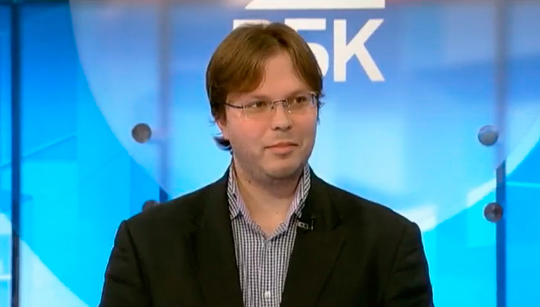Vitaliy Roud: “Innovations Mean Multiple Communications. It Is a Difficult and Risky Strategy”
In the Bloomberg's ranking of the world's 50 most innovative countries, Russia is on the 26th place, and it lost ground heavily (by 14 points) in comparison with other countries. Vitaliy Roud (research fellow, Laboratory for Economics of Innovation, HSE ISSEK) commented the Bloomberg Innovation Index which includes a small proportion of indicators Global Innovation Index (GII) on RBC TV.

The Bloomberg Index is based on a specific methodology that takes into account seven indicators, including such as research and development expenditure (% of GDP), productivity, concentration of high-tech companies, postsecondary education, value added by manufacturing, patents activity and research personnel. External experts believe that such a set of indicators is limited, and it poses a particular challenge in the evaluation of the factors of countries’ innovative development.
This sharp plunge of Russia in a new ranking of Bloomberg Analytics is the result of sanctions and oil price declines which heavily affected Russian domestic industry. Vitaliy Roud drew attention to the fact that Bloomberg analysts added “productivity of innovation” as an indicator. For the Russian Federation, this indicator is extremely low, which partly explains the drop in this ranking compared to the previous year, the researcher emphasized.
Vitaliy Roud emphasized that there are more comprehensive measures of the aggregate innovation performance, in particular, the Global Innovation Index-GII. This annual ranking is co-published by Cornell University Consortium (U.S.), INSEAD Business School (France), and the World Intellectual Property Organization (WIPO), whose cooperation with the Higher School of Economics has been going on for several years.
Unlike the new Bloomberg Innovation Index, this ranking is based on 82 variables covering different characteristics of innovation, such as institutions, human capital, research, infrastructure, market sophistication, business sophistication, knowledge and technology, and creative outputs. In this ranking, Russia is 43rd among 128 countries, up five positions from its 2015 ranking.
“Bloomberg Innovation Index leaves many questions about what innovations are and what the authors mean by innovations” — stands Vasily Markov, the Director of Deloitte CIS who also appeared on the TV channel. Comparing two innovative ratings, Global Innovation Index generates more interest as it is based on a larger number of indicators.
Vitaliy Roud participated together with the First Vice-Rector, Director of Institute of Statistical Studies and Economics of Knowledge Leonid Gokhberg in the preparation of analytical reports that were released simultaneously with the Global Innovation Index in 2012 and 2016.
The authorities always have a temptation to focus on particular technologies, breakthrough industries while business relies on extensive or short-term profit strategies, far from innovations. In addition, an ISSEK research show, there is not necessarily a direct correlation between innovations and commercial success of Russian companies — this fact is also admitted by 50% of innovation firms (based on a regular surveys). "Innovation is a risky strategy, which involves complex multiple communications with science, universities, and other counterparties" said Vitaliy Roud. He emphasized that coherence in policy and observations of the general conditions are of paramount importance for innovation support.
TV Programme “RBС. Prime-time” with Vitaliy Roud (from 11th minute) on RBС TV.
By Irina Agapova
Translated by Karina Zagitova
